Your Guide to Cutting Down on Plastic Use
Plastic waste is everywhere. From the intricate webs of our waterways to the highest mountain peaks, plastic debris has become a significant threat to our environment. If you're searching for actionable steps to reduce plastic use, this comprehensive guide will empower you with knowledge, strategies, and real-life solutions for minimizing plastic in your daily routine.

Understanding the Plastic Problem
In the last few decades, plastic pollution has skyrocketed. According to the United Nations, every year we produce about 400 million tonnes of plastic waste worldwide, with much of this ending up in our oceans, landfills, or being picked up by the wind and carried for miles. The low cost, convenience, and durability of plastic have boosted its consumption, but at a significant environmental price.
Why Should We Reduce Plastic Usage?
- Protect Wildlife: Millions of animals mistake plastic for food or become entangled in it, resulting in injury or death.
- Improve Human Health: Microplastics have been found in our food, water, and even air, posing unknown health risks.
- Decrease Carbon Footprint: The production and incineration of plastics are major contributors to greenhouse gas emissions.
- Preserve Natural Resources: Reducing plastic use helps save petroleum and other resources used to make new plastics.
Practical Ways to Cut Down on Plastic Use
Seeking to reduce your plastic consumption? Here are effective, practical steps you can follow to decrease plastic waste and embrace a more sustainable lifestyle.
1. Rethink Your Shopping Habits
- Bring Your Own Bag: Invest in sturdy, reusable shopping bags made from cloth, jute, or canvas. Leave a couple in your car or bag to avoid plastic bags at checkout.
- Choose Products with Minimal Packaging: Opt for items with little or no plastic wrapping. Favor glass, cardboard, or aluminum, all of which are generally easier to recycle.
- Buy in Bulk: Purchasing products in bulk not only cuts down on unit cost but also reduces single-use plastic packaging.
- Skip Produce Bags: Most fruits and vegetables have natural protection. Bring your own reusable mesh or cloth produce bags.
2. Switch to Reusable Alternatives
- Water Bottles & Coffee Cups: Use refillable stainless steel or glass bottles instead of disposable plastic bottles. Bring your own reusable cup for takeout coffee.
- Food Containers: Choose stainless steel, glass, or silicone containers for food storage, school lunches, and leftovers.
- Cutlery: Carry a portable bamboo or metal cutlery set and say no to disposable plastic forks and spoons.
- Straws: Invest in metal, silicone, or paper straws and refuse plastic ones when dining out.
3. Personal Care & Cleaning Swaps
- Soap Bars: Replace liquid soap or body wash in plastic bottles with package-free soap bars.
- Shampoo and Conditioner Bars: Make the switch to solid bar hair products that come without plastic containers.
- Bamboo Toothbrush: Trade in your plastic toothbrush for one made from bamboo.
- Reusable Cotton Pads: Swap single-use makeup wipes and cotton pads for reusable fabric alternatives.
- DIY Cleaning Solutions: Mix your own cleaners using vinegar, baking soda, and lemon juice to avoid buying new plastic bottles of cleaning agents.
4. Rethink Food Storage
- Beeswax Wraps: Use beeswax-coated cloths instead of plastic wrap to cover bowls or wrap sandwiches.
- Glass Jars: Repurpose glass jars for storing dry goods, leftovers, or even freezing soups.
- Silicone Storage Bags: These are dishwasher- and freezer-safe and replace single-use sandwich bags.
5. Embrace Sustainable Shopping & Lifestyle Choices
- Shop at Farmers' Markets: Farmers often use much less plastic packaging than supermarkets, and you can bring your own containers.
- Support Businesses with Plastic-Free Policies: Spend your money where it counts and encourage local businesses to reduce plastic waste.
- Buy Secondhand: Thrift shops and online marketplaces offer clothing and household items with less packaging and a lower overall carbon footprint.
More Tips to Reduce Plastic Waste in Everyday Life
Break the Takeout Habit
- Request No Plastics: Ask for no cutlery, straws, or sauce packets when ordering takeout or delivery.
- Bring Your Own Containers: Some eateries allow you to bring your own containers for leftovers or takeout.
Host Plastic-Free Events
- Use Real Dishes: For parties and gatherings, use ceramic, glass, or metal dinnerware instead of disposable plastic ones.
- Decorate with Reusable Items: Choose cloth banners and reusable tablecloths rather than plastic decorations.
Shop Mindfully Online
- Group Purchases: Buy items together with friends or neighbors to reduce individual shipping and packaging.
- Request Minimal Packaging: Many retailers allow you to request less packaging or choose eco-friendly shipping options at checkout.
Educate and Advocate
- Spread the Word: Share your experiences and tips for cutting down on plastic with friends, family, and on social media.
- Contact Brands and Policy Makers: Ask companies to reduce plastic packaging and support legislation that bans single-use plastics.
Understanding Types of Plastics & How to Avoid Them
Not all plastics are created equal. By understanding the seven main types of plastic, you can make more informed decisions and better reduce your plastic footprint.
- PET (Polyethylene Terephthalate): Used in water bottles and food packaging. Easily recyclable but often ends up as waste.
- HDPE (High-Density Polyethylene): Found in milk jugs and detergent bottles. Widely recycled.
- PVC (Polyvinyl Chloride): Used in some food wraps and pipes. Rarely recycled; contains harmful chemicals.
- LDPE (Low-Density Polyethylene): Used in grocery bags and six-pack rings. Difficult to recycle.
- PP (Polypropylene): Commonly found in yogurt containers and straws. Can sometimes be recycled.
- PS (Polystyrene): Known as Styrofoam. Rarely accepted by recycling programs.
- Other (Various Plastics): Includes acrylics and nylon. Not recyclable with standard plastics.
Tip: Always check the recycling codes on plastics. Where possible, switch to biodegradable or compostable alternatives, or avoid plastic products altogether.
The Importance of Recycling (But Not Relying on It)
While recycling is important, it's not a perfect solution. Most recycling systems can't process all types of plastic, and huge amounts end up in landfills or oceans. The mantra Refuse, Reduce, Reuse, Recycle--in that order--is more relevant than ever. Focus on preventing plastic from entering your life in the first place, and recycle only as a last resort.
Cutting Down on Plastic in the Workplace & Schools
- Plastic-Free Lunches: Use bento boxes, reusable utensils, and cloth napkins for school or work lunches.
- Water Stations: Encourage the use of water coolers and refill stations to eliminate bottled water.
- Bulk Purchasing: Purchase office supplies and snacks in bulk to minimize packaging waste.
- Recycling Programs: Implement or improve recycling and composting programs.

Frequently Asked Questions About Cutting Down on Plastic Use
Is cutting down on plastic use really effective?
Absolutely! Every item you refuse or reuse eliminates potential waste and sends a powerful message to manufacturers and policy makers. When millions start reducing plastic use, demand for single-use plastics drops, driving positive change.
What about biodegradable or compostable plastics?
These are better alternatives, but they may not always break down in everyday environments or be accepted at local composting facilities. The best solution is to reduce all types of plastic whenever possible.
How can I help my community reduce plastic consumption?
- Lead by example--bring your reusable bag, bottle, and cup everywhere.
- Organize cleanup events to raise awareness about plastic waste.
- Work with local businesses and governments to encourage or legislate for reduction measures.
Conclusion: Your Journey Toward a Plastic-Free Lifestyle
Cutting down on plastic use is a rewarding journey that benefits both our environment and health. While it's challenging to eliminate plastics entirely overnight, making small, consistent changes in your consumer habits can create a meaningful impact. Start with a few swaps, share what you learn, and keep striving toward less plastic and a cleaner planet.
Remember:
- Refuse unnecessary plastic whenever you can.
- Reduce use by choosing reusables and shopping smart.
- Reuse and repurpose before recycling to maximize lifespan and minimize waste.
- Recycle responsibly, and help improve recycling systems in your community.
Together, we can shape a world where single-use plastics are a thing of the past and sustainability is at the forefront of all our everyday choices.